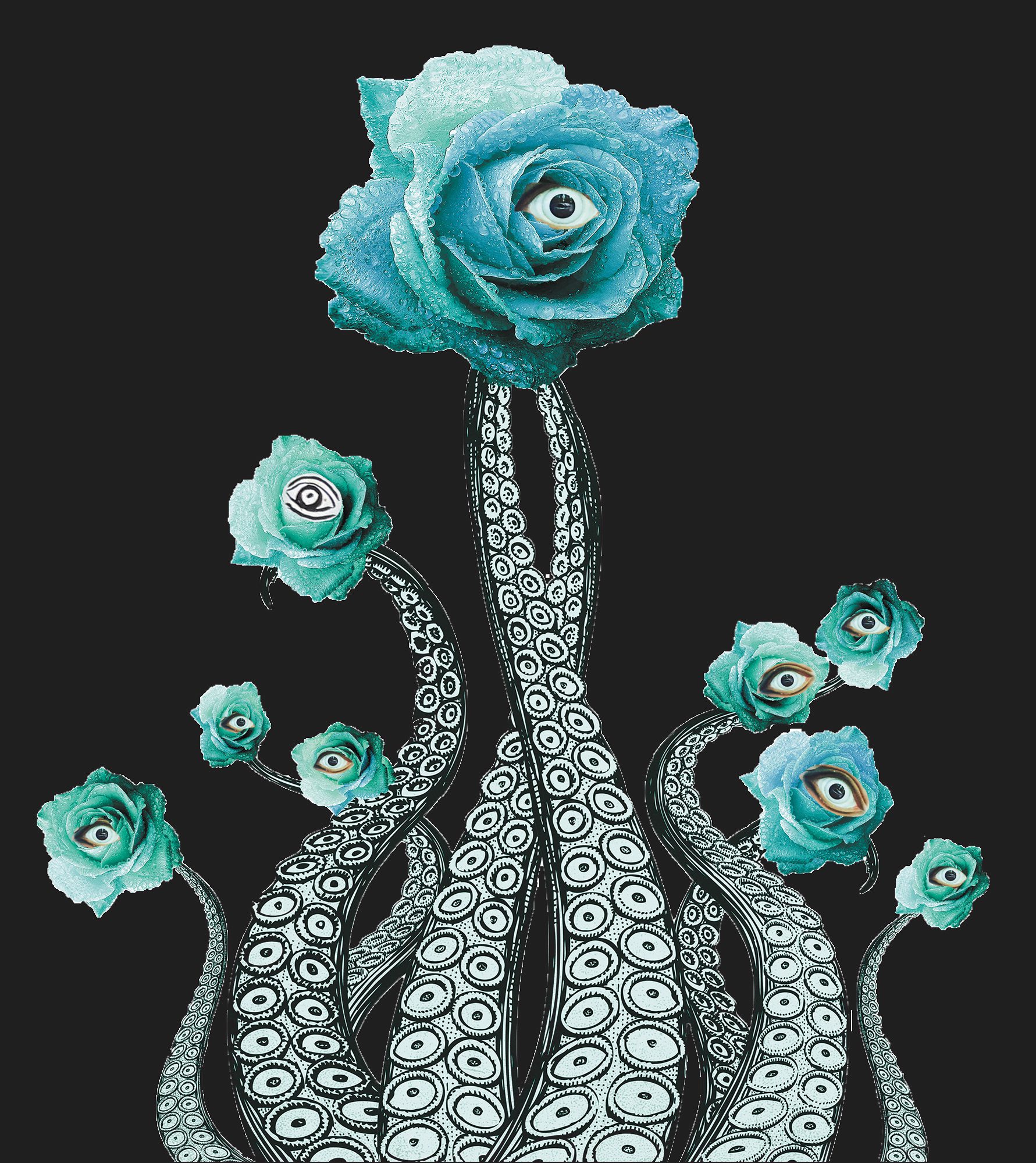
Octopus Factory Galaxy
By Jason Heller
Published Issue 141, September 2025
Henry Oxford Wallace walked through the doctor’s garden with his head wrapped in mist, squinting as if seeing its verdant splendors for the first time. Sunlight streaked across the sky like soapsuds. Clockwork hummingbirds siphoned gasoline from metallic flowers. In the distance, nude children danced with animals and uprooted saplings in some kind of mindless, wind-up pantomime.
This made Henry want to cry, but no tears would come. He raised his hands to his face, brushed his fingertips along his scarred and bearded cheeks.
Then he felt them, smooth as bone. The dice. He remembered: He’d been given dice for eyes.
“Henry?” The voice behind him gave him a start. “Henry, come back to the house with me. The doctor can help. There’s too much to see out here right now. We’ll come back when it’s dark. It won’t be so frightening then.”
“Yes, Eleanor,” he said, taking his sister’s hand. He dared to glance down at it. Instead of skin and nails, the flesh of her fingers was sheathed in waxed paper and shattered glass.
—
When they returned to the house — the doctor’s country estate, far from the gaslit streets and loud Model Ts of the nearby city — Eleanor called upstairs to their host. Dr. Islington came down, spindly and flushed, and led Henry to his examination room, shutting the door behind them. As the larger man took out his notebook and pen, Henry stood shivering in the middle of the room, trying to avoid the large mirror hanging alongside the charts and diagrams on the wall.
But a stolen glimpse reflected the same image he’d begun seeing the day before: two bone-white dice, polished to pearly opalescence, pivoting in the deep, wide sockets where his eyes should have been. The numbers six and a three were facing forward, nine tiny black dots, dilated and baleful.
“Sorry, Henry, very sorry.” Dr. Islington gestured at the mirror. “I should have covered that up. It’s, ahem, still the dice you see, eh?”
Henry tried and failed to tear his gaze from the mirror. “Yes, Doctor. But … it’s more than just that. I’ve been seeing other things, too. In the garden today, with Eleanor, everything around me looked strange. More so than usual, even.”
The doctor began scratching in his notebook. “Sit down, my boy,” he bid Henry. “Describe it to me.”
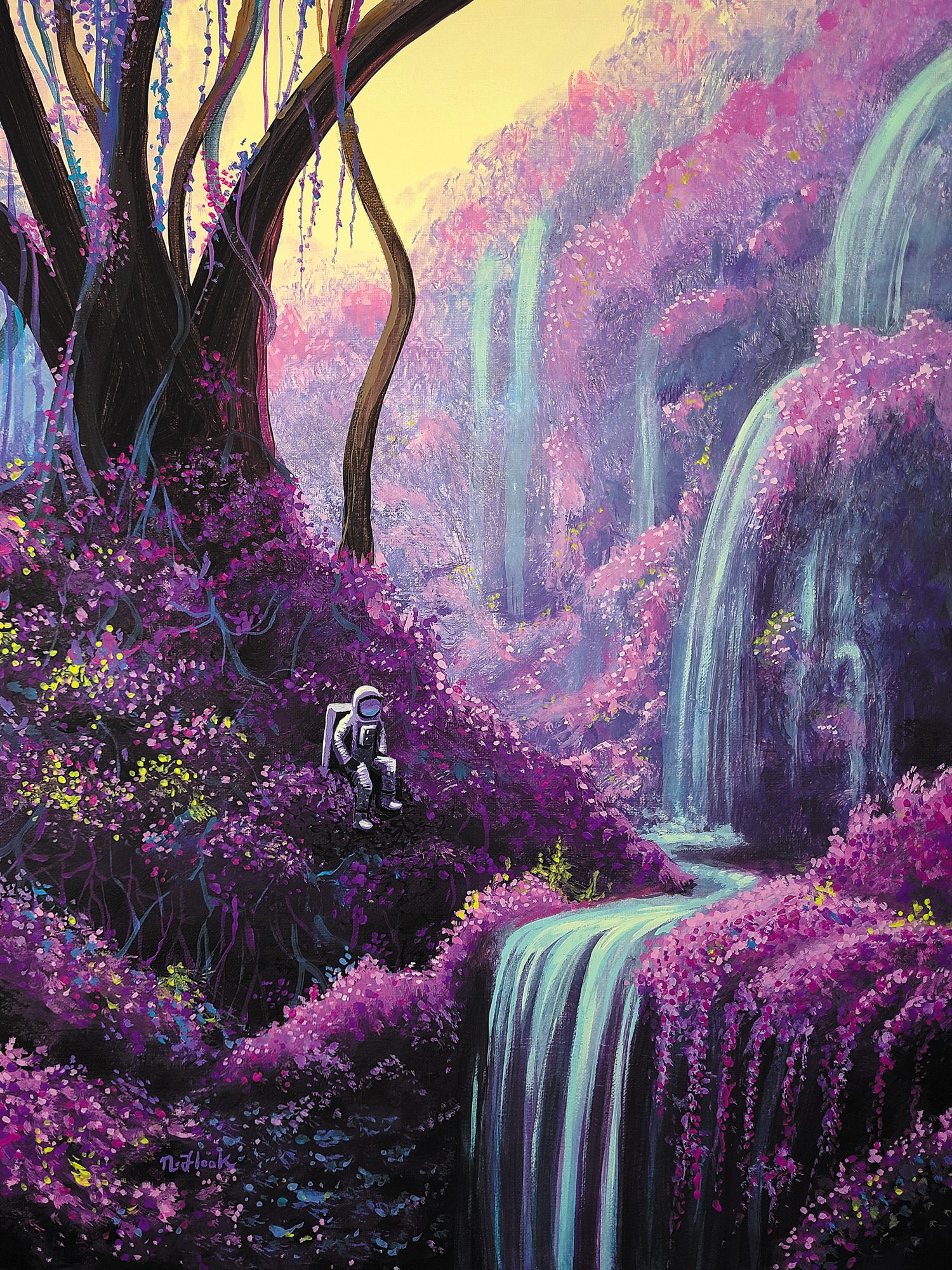
Henry did. He told Dr. Islington about the carnival of visions in the garden, the odd and impossible phantasms that swam in the corners of his new eyes. He tried to put into words the children and animals, the hummingbirds and flowers, the sun and its vibrant scum of lemony foam.
But that wasn’t all, Henry continued. Earlier that day he’d sent the doctor’s servants out of the kitchen so that he could cook breakfast with Eleanor. They’d loved cooking breakfast together as children. But as Henry cracked eggs into a bowl, each yolk appeared to him as a jellied ocean squirming with swarms of unborn stars. Then, just as his knife was about to descend into a loaf of dark rye, it turned into a little, slate-shingled house bustling with the members of a soberly dressed and Lilliputian family.
His sister, of course, had seen only eggs and bread on the table before them, and could do nothing but clasp her brother’s hands and coo into his ear as he whimpered in confusion.
“It’s getting worse,” Henry concluded. “Can’t you figure out what’s the matter? Don’t take me wrong, Doctor. I’m grateful for the operation, to be able to see again. And you’ve been very generous letting Eleanor and myself stay here while I recuperate. But I … I fear I’m going mad. I haven’t had the blessing of sight since I was seven-years-old. The world looks strange enough to me as it is. But now? I can’t tell which visions I should heed as reality and which I should dismiss as apparition.”
Dr. Islington put down his pen and steepled his fingers. His eyes twinkled under a heavy brow. “Henry, I can’t tell you with certainty what’s happening to you. But I do have a theory. This procedure I used on you, as you’ve known from the beginning, is an experimental one — a marvel only possible in this enlightened new century. But rerouting the channels of your brain to bypass the tissue damage that had blinded you all those years ago… to be honest, I was operating a bit blind myself.”
The doctor gave a low chuckle then shifted himself in his chair as Henry, unaware that he was staring, bore into the man’s face with his eyes.
“What I believe is occurring,” Dr. Islington went on, avoiding Henry’s gaze, “is an awakening. A rebirth of what the philosophers have called the mythopoeic mind. See, Henry, before science eclipsed the scientist himself and recast the human psyche in its own rigid image, our minds were much more fluid and intuitive. Our perception was wildly subjective. Long ago, for instance, two individuals from two different tribes of man could look at the same object — a stick, say, or a snake — and see two wholly different things. The wars of that pre-scientific era weren’t simply conflicts over resources. They were battles between epistemologies, between distinct interpretations of sensory input, between irreconcilable empirical realities. In a way, men fought over the right to see the world the way they wished, and to populate that world with objects and gods of their own invention.”
The doctor paused for a moment to peer out the window of the examination room, his eyes lingering on the artful arrangements of shrubs and stones in the garden beyond. “What I’m proposing, Henry, is this: These are no mere hallucinations you’ve been witnessing. They are what I would classify as mythopoeic manifestations. In short, sir, they are metaphors.”
Henry rubbed his temples in hard, small circles, as if trying to accelerate his inner processing of the doctor’s ideas. “If you’re right,” Henry said eventually, his voice rising, “then what about my eyes? What are these dice supposed to be goddamned metaphors for?”
The doctor answered with Henry an unreadable expression. Then he smiled at the younger man.
Henry made every effort not to scream as the doctor’s face suddenly flowered into a violent, bruise-colored cloud. The smoky mass spread upward from his starched collar to the ceiling, seething all the while with tiny figures that appeared to be either locusts or vultures.
“Why, it’s obvious, Henry,” the doctor’s voice echoed from deep within the purple nimbus that had been, just a moment ago, his head. “The dice symbolize uncertainty. Everything that is not yet known. Wasn’t your entire operation, after all, a gamble?”
—
That night Henry laid awake and listened to the apple trees beyond the garden swish in the stiff wind of an incoming storm. The trees, he comforted himself, at least sounded like trees.
Eleanor had been right. The night was much easier for Henry. As the doctor had explained to them soon after the operation, while Henry’s eyes were still bandaged, less light means less visual stimulus entering the brain. The closer Henry could come to his previous state of absolute blindness, the less he was prone to these terrific visions. Even then, there seemed always to be a glee the doctor exhibited in hearing about and recording in his notebook Henry’s latest phantasmagorical episode.
A hiss from outside his window jolted Henry out of his thoughts. “Brother, it’s me. Come down.” He parted his curtains, and even in the dim light he could see Eleanor’s long, pale hair undulating in the wind. As lightning danced in and out of the racing clouds, her locks took on the appearance of tentacles.
Henry squinted. “What are you doing out there?” he whispered back. “You’ll wake the doctor. Come back inside.”
He heard her laugh, the same mischievous giggle she’d had since they were children. Then the luminous mass of her hair — now blonde, now green, now blonde again — bobbed away in the lightning-charged darkness toward the garden.
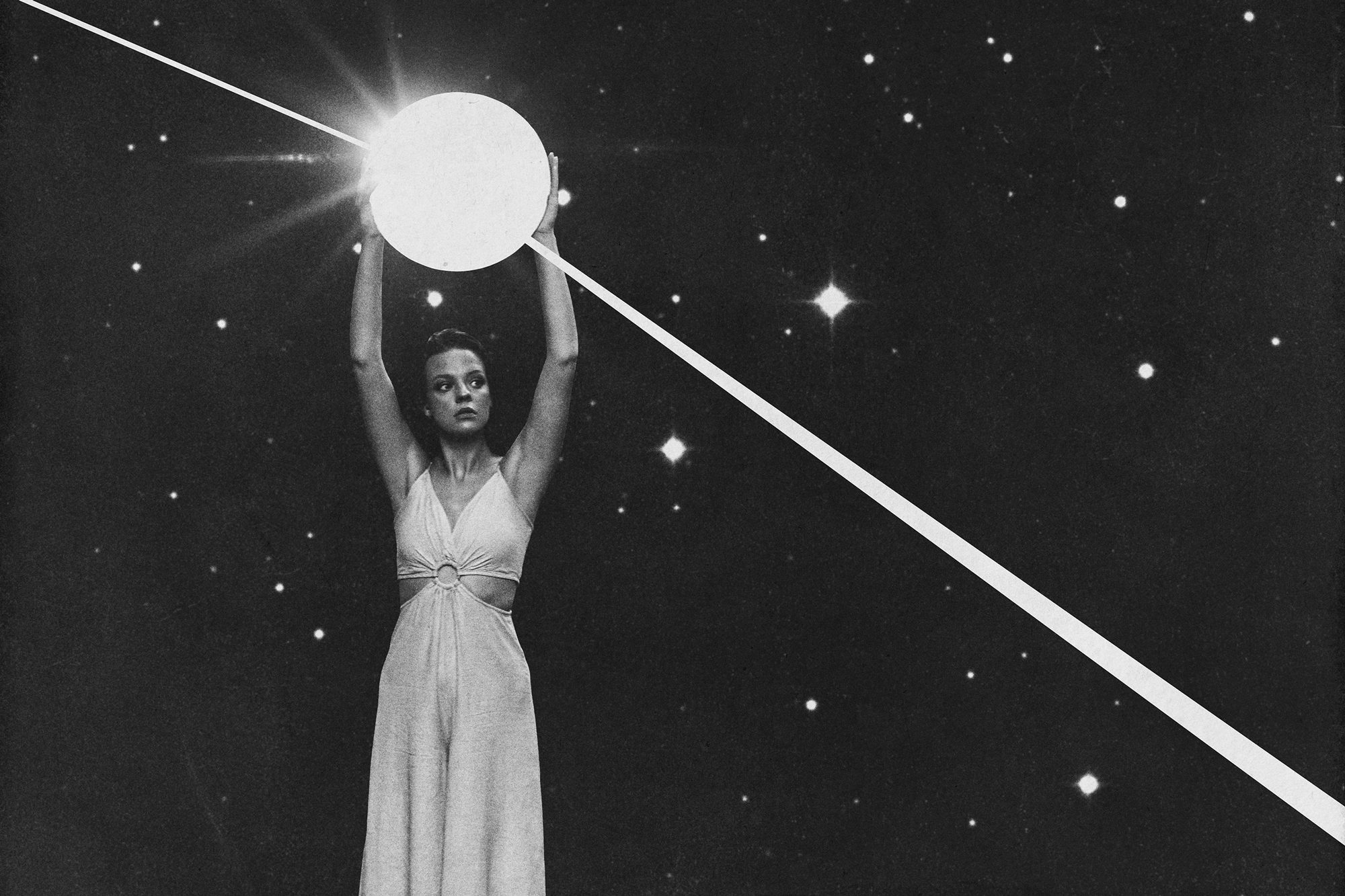
As Henry slept that night, he dreamed he and Eleanor were both children again. They played upon the gleaming new tracks the rail company had stitched across the fields behind their grandmother’s house. All manner of beasts, machines, and combinations thereof crawled along those tracks as Henry groaned and turned in his bed: steam engines curled first into nautili, then into pachyderm-shaped gramophones, and then into electric-eyed cats that licked their sparking fur with ferrotype tongues bearing images of comets and atoms. Around that mad factory, that assembly line of illusion, Henry and Eleanor darted and laughed, gorging themselves on the ripe, metallic berries that sprang as if by magic from their footprints until their lips were blue and their bellies sore.
Henry awoke with a start, the storm still raging and the sky like ink. As he savored the already fading images of his dream, he remembered what their mother had said years ago after hearing Henry babble wild tales of the menagerie in grandmother’s fields: “You will be a poet someday, Henry. In the age of steam and electricity, a poet. God help you.”
That was before the auto accident, before he’d gone blind. True to his mother’s prediction, though, he did become a poet of sorts. Not one of any particular stature; more of a hobbyist really. But spending his afternoons sifting through his memories to catch every last ghost of his youth kept him somehow sane, even as it left him buried in notebooks, filling page after page with verse he could not see.
Notebooks. That thought shook Henry out of his reverie. Of course. As he reached for his robe in the dark of his room, a crack of thunder rattled the house. Henry swore his sister’s laughter rose from out the garden to join it.
—
The doctor’s examination room was shuttered and unlit. Henry, however, was used to negotiating the dark. He crossed the room in stocking feet and stopped at the edge of the desk. Soon his fingers found a drawer and, in it, Dr. Islington’s notebook. As Henry groped for a candle and then lit it, letting his eyes adjust to the flame, he remembered the doctor’s metamorphosis of the day before, the terrific sense of awe it had instilled in him. Then he flipped through the notebook until he found the Islington’s most recent entry:
May 18, 1913
Today, a break-through profound enough to make the philosophers proud! Our young man Henry has far surpassed anything of which we could have dreamed. But let’s not pervert Henry’s magnificent new state of being by speaking of it in terms of dreams as the quack Freud might. Rather, Henry’s apparitions are of true mythopoeic significance. They are a new epistemology, an epiphany! This man, his sight denied him for so long, has leapt both forward and backward in psychic evolution, as befits the cyclical nature of our human consciousness. And even better: This evolution seems to be accelerating at an exponential rate, a feedback loop in which his visions feed on themselves. We must give eternal thanks to Eleanor for volunteering him for the operation; finding the perfect candidate such as Henry — a man who had lost his biological sight yet retained the innate eye of a poet — was not easy, and Henry has been more than worth every penny we paid his sister.
Here Henry stopped reading. Paid? Eleanor? She had told Henry that she’d depleted most of the family’s savings to pay for Dr. Islington’s operation. There had been no mention of her getting paid. Puzzled, he reached to turn to the next the page of the doctor’s notebook — but he stopped as he heard footsteps in the hallway outside. Before he could think of hiding, the door of the examination room opened.
It was the doctor.
“Henry? What are you doing in here, my boy?” Islington was wearing pajamas, and his thin hair was disheveled. Henry almost didn’t notice the pistol in his hand.
“I think I’m the one who should be asking questions here, Doctor.” He held up the notebook. “What is this? What does this mean? Am I your patient or your, your guinea pig? What have you and my sister been keeping from me?”
Islington lowered his pistol. “Henry,” he pleaded, “you misunderstand.” He crossed the room to where the younger man stood at the desk, his steps light and careful. “This has been the arrangement all along, see? You’re not simply regaining your sight. You’ve been given the truest sight of all, your birthright as a human being–the godlike perception that’s been clipped and corrupted by this sick and scientific world.
“We’re wielding science against itself, don’t you see? There are many of us, men of learning and wisdom, and we’ve put you on the path, we believe, to the ultimate vision, to bear witness to the ultimate metaphor.” He grabbed his notebook off his desk where Henry had been reading it. “But you must stay with me, Henry. You must tell me what you see. Before this is all over, you may very well gaze upon the face God, of Creation itself. You must tell us what form it takes. You must allow your poet’s mind, that delirious eye, to be our microscope aimed at the heart of the cardinal metaphor!”
The doctor began waving his pistol in the air as his voice climbed in pitch and ardor. Henry froze. On impulse he glanced at the mirror across the room, the one the doctor had always failed to cover up. He saw with alarm that his eyes were, in fact, no longer dice. Instead they had become fireworks, kaleidoscopes, maypoles, merry-go-rounds, all at once, spinning and sparking and spitting more colors than he ever knew existed.
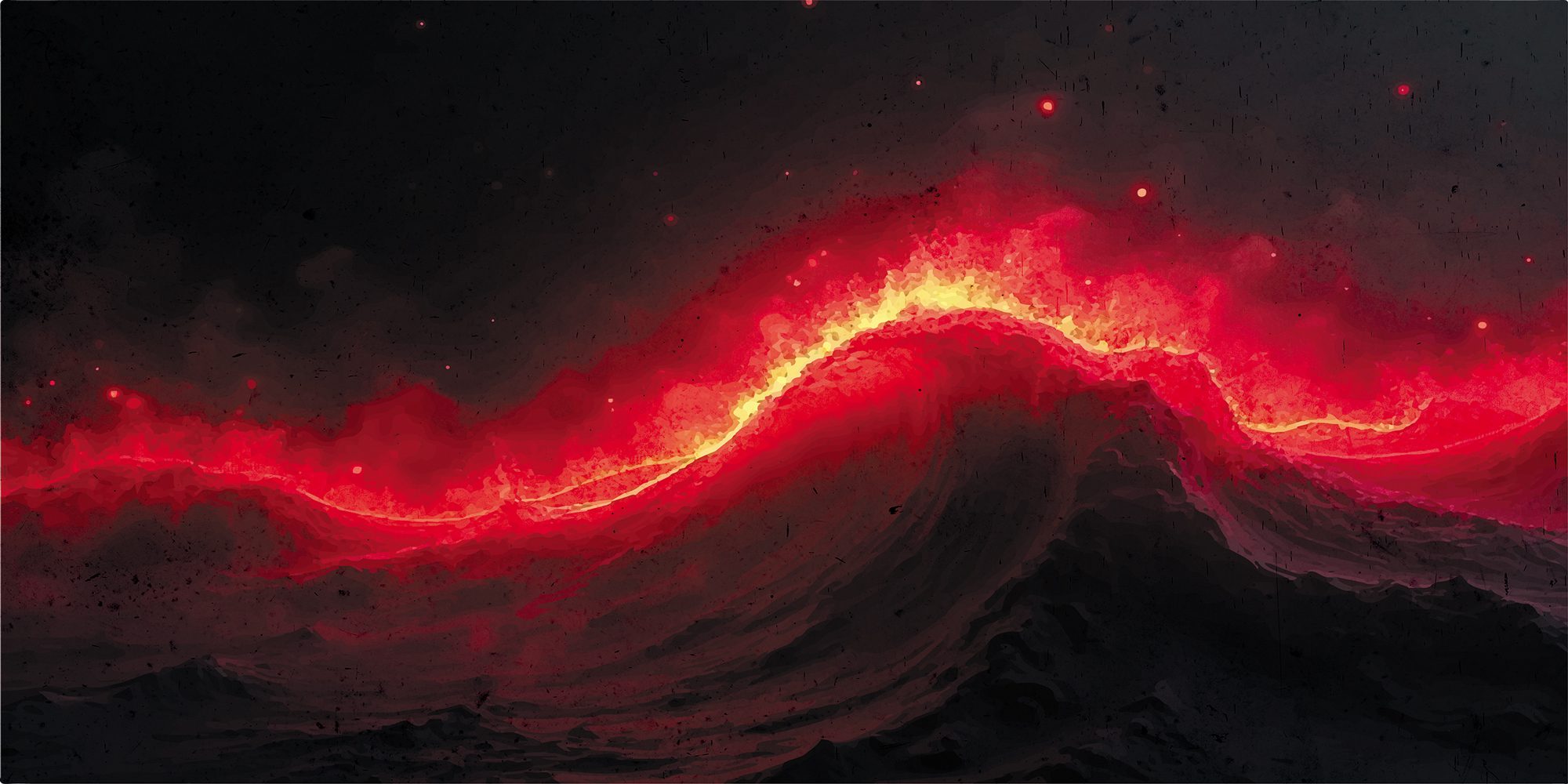
Henry lunged across the desk and grabbed the pistol from the doctor’s hand. It turned to raw meat in his grasp, its wet weight flopping across his knuckles. Then he turned it around, found a trigger made of gristle, and pulled it. A putrid jet of jellylike lymph arced through the room, stinking and steaming in the air. As serpents and vapors spewed from the whirlpool that had once been the doctor’s head, Henry heard his sister’s scream come from outside, from the rain-swept garden. He walked through a giant mouth that had opened in the wall of the room, careful to avoid its dripping teeth, and went to find her.
—
“Eleanor!” he yelled into the storm as he trudged through the lush muck of the garden. The soft patter of rain had picked up once more, and the wind blew black clouds across the faint rinse of sunrise on the horizon. He realized he still had the gun in his hand — only the meat had melted into the flesh of his hand, and his hand had in turn become the gun, his thumb the barrel, his bitten nails the bullets.
Caught by the gale, the very substance of his new eyes streamed through the wet spring air in front of his face like egg whites in a pot of boiling water. Each of his eyes, he realized, could now see itself, and Henry felt proud at having achieved such an exquisite paradox. He could also see that his eyes had begun to change form every few seconds: now diamonds, now jellyfish, now testicles, now nebulae. In a spasm of inspiration, he severed the thin tethers that rooted them to his head; free at last, they hovered balloon-like above of him.
So bemused, Henry at last saw Eleanor among the trees, naked and dancing with the animals as those haunted children had the day before. He reached out to her with his new hand, and it screamed at her. She fell. Ribbons of seaweed sprouted from her lips, and the mud of the garden sucked at her body like a mouth.
Day broke. Henry looked down upon his sister, his new eyes bubbling high among the apple blossoms, and he saw that she was good. She was, in fact, no longer his betrayer, no longer sister, no longer little Eleanor — but a giantess throbbing with the probability of every woman, every human, that had been or could ever be. She was at once an octopus, a factory, a galaxy, and she raised her muddy, myriad arms in a sensuous spiral to him.
Henry scooped a bed out of the wet soil of the garden and took this monster, this mother, and he joined her, as he only should in this world of cubes and colors, his new eyes smiling and crawling with larvae in the raw sugar sun.
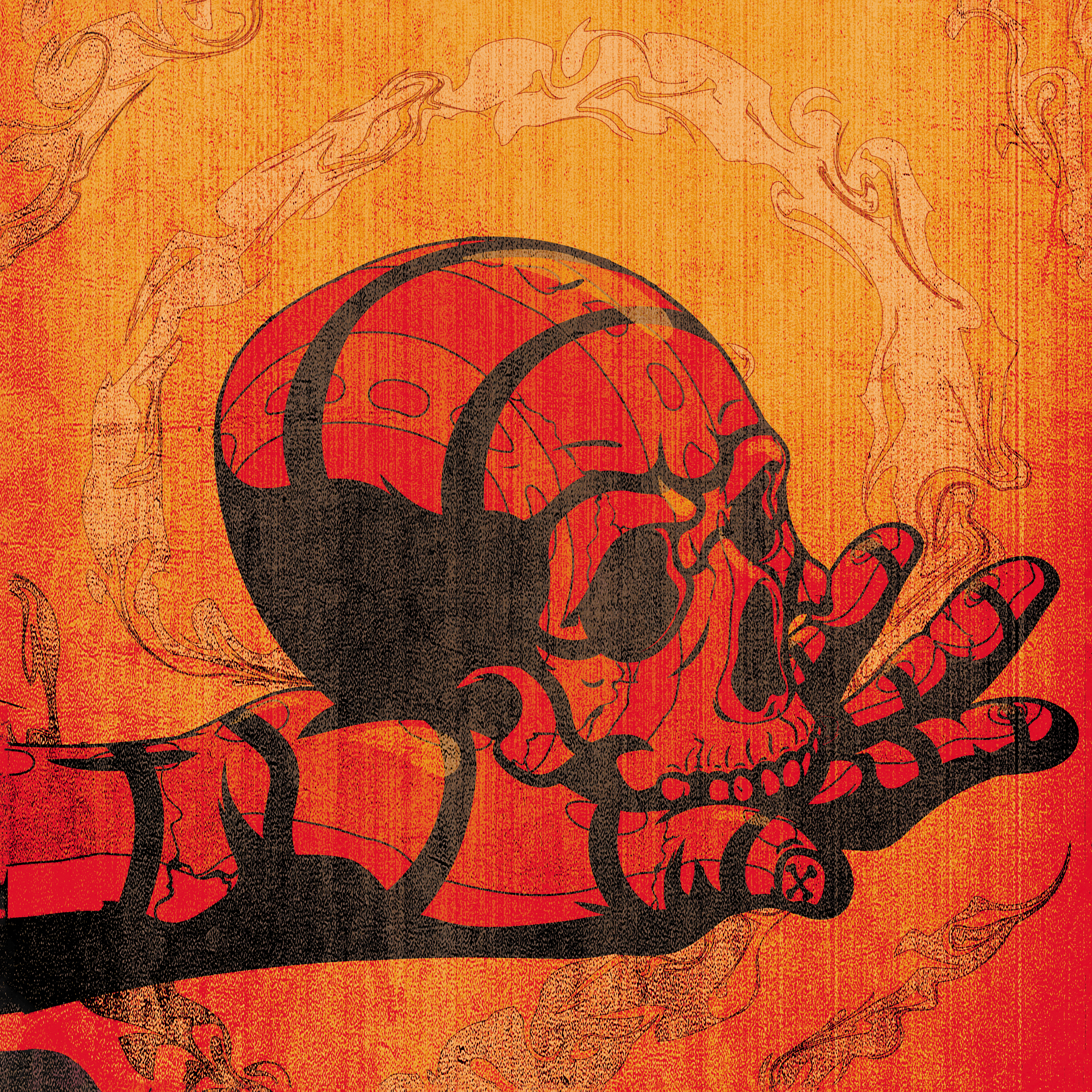
Jason Heller is a journalist, editor and author whose books include: Strange Stars (Melville House); the alt-history novel Taft 2012 (Quirk); the Goosebumps tie-in Slappy’s Revenge (Scholastic); the Pirates of the Caribbean tie-in The Captain Jack Sparrow Handbook (Disney); and a chapter of Ann and Jeff VanderMeer’s The Time Traveler’s Almanac (Tor). He’s also the former nonfiction editor of Clarkesworld and won a Hugo Award as part of that editing team. His short stories have appeared in Apex Magazine, Farrago’s Wainscot, Sybil’s Garage, Paper Darts, Nightmares Unhinged, Swords v. Cthulhu and many others. He writes about books and/or music for NPR, Rolling Stone, Pitchfork, and The New Yorker, and is a former Senior Writer of The Onion’s A.V. Club. His writing has also appeared in Weird Tales, Entertainment Weekly, Alternative Press, and Tor.com. He is the co-editor of the Cyber World (Hex) and Mechanical Animals (Hex), and is a 2009 graduate of the Odyssey Writing Workshop. He lives with his wife Angie in Denver, where he play in various bands.
Check out Jason’s last Birdy install, The Climbers, in case you missed it, or head to our Explore section to see more of these talented creatives’ work.
